Unit 11 Sad movies make me cry.Section B (2a-2e) Reading课件(41张PPT)
文档属性
| 名称 | Unit 11 Sad movies make me cry.Section B (2a-2e) Reading课件(41张PPT) | 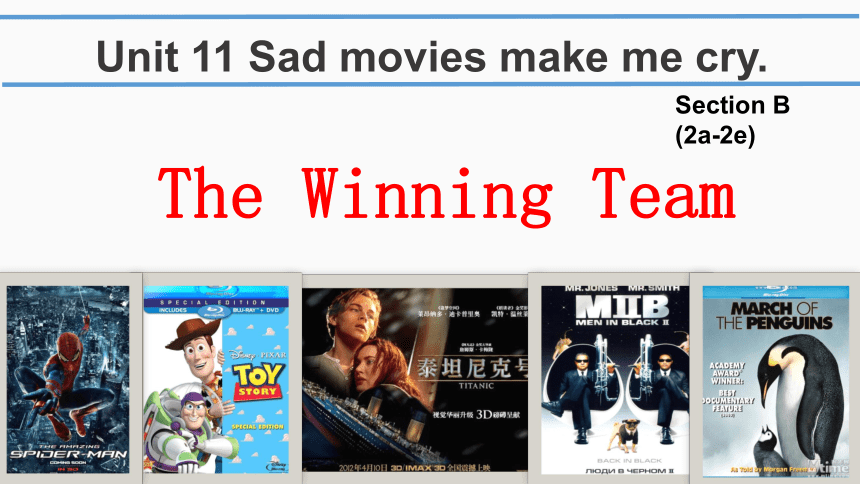 | |
| 格式 | pptx | ||
| 文件大小 | 15.8MB | ||
| 资源类型 | 教案 | ||
| 版本资源 | 人教新目标(Go for it)版 | ||
| 科目 | 英语 | ||
| 更新时间 | 2021-02-11 14:59:06 | ||
图片预览

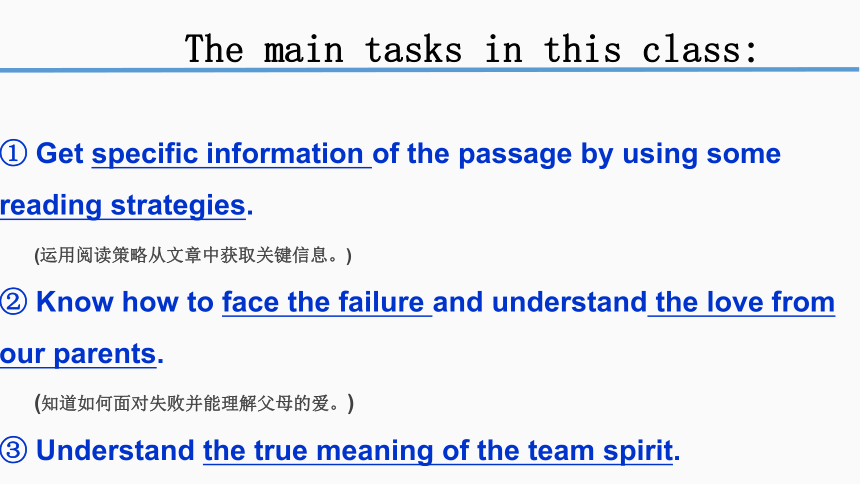
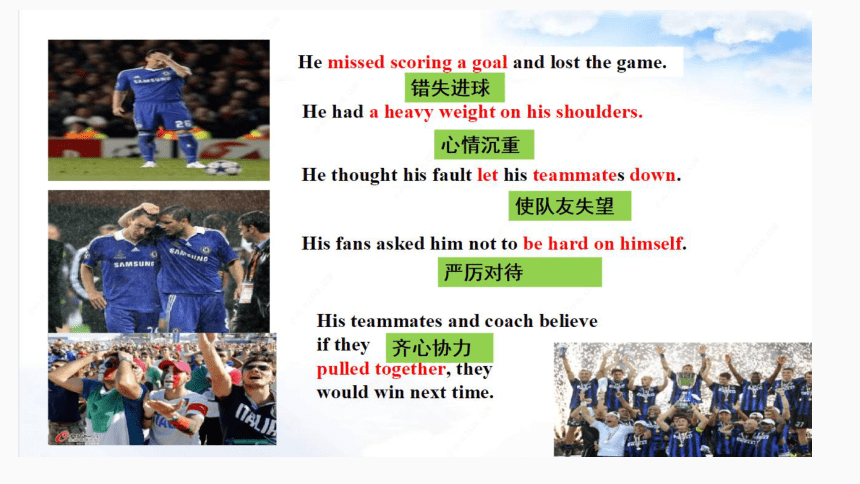
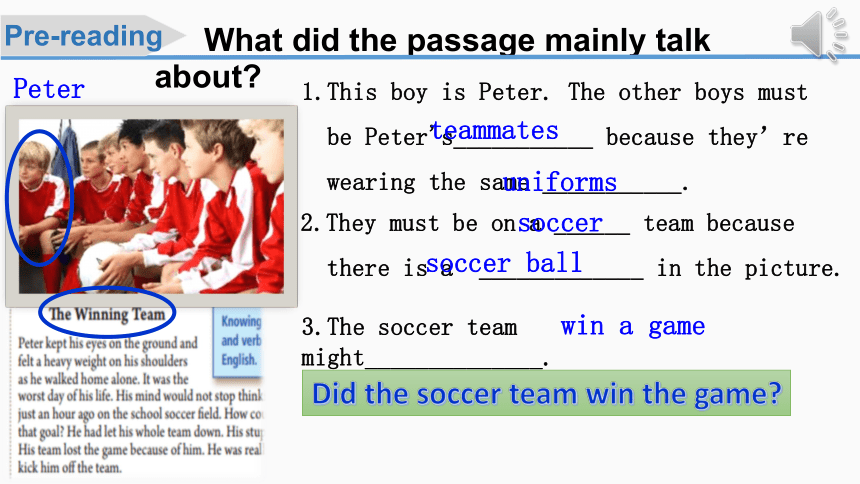
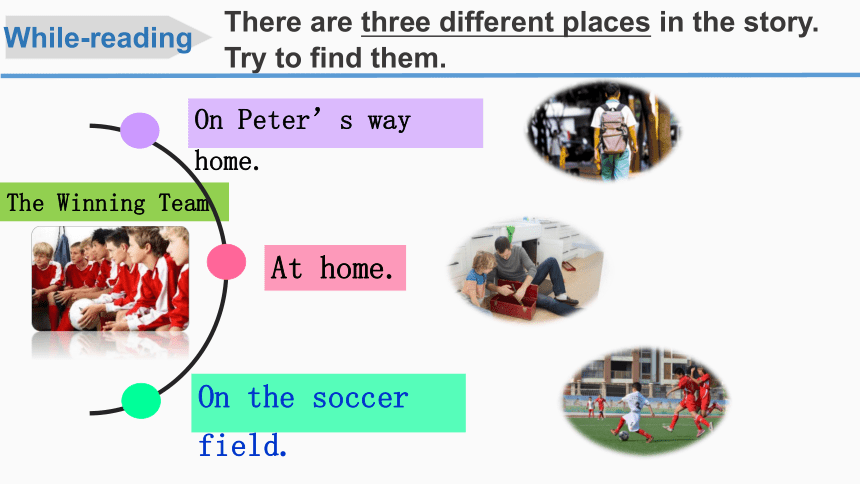
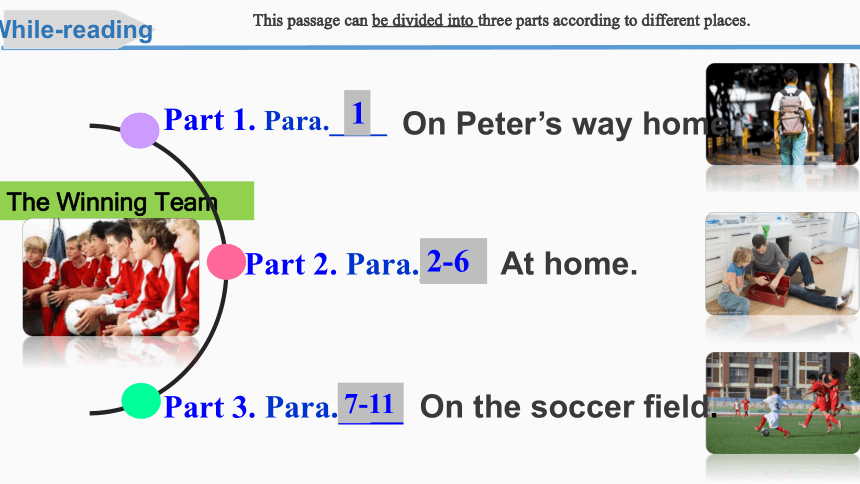
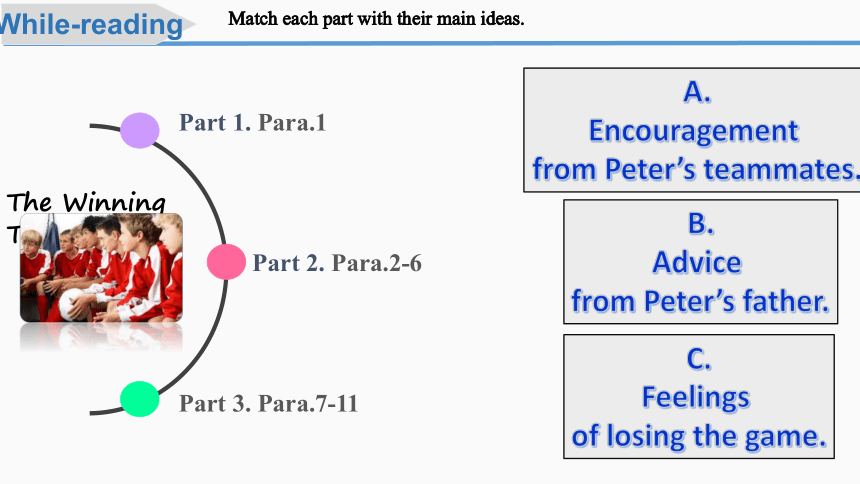
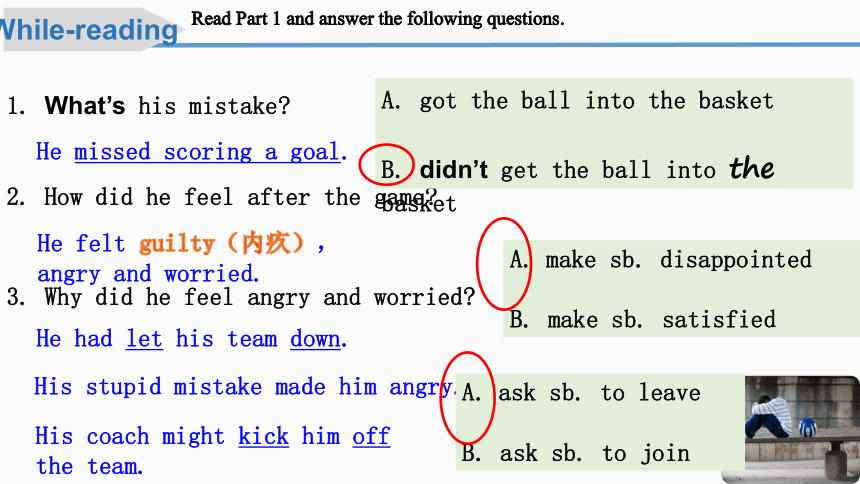
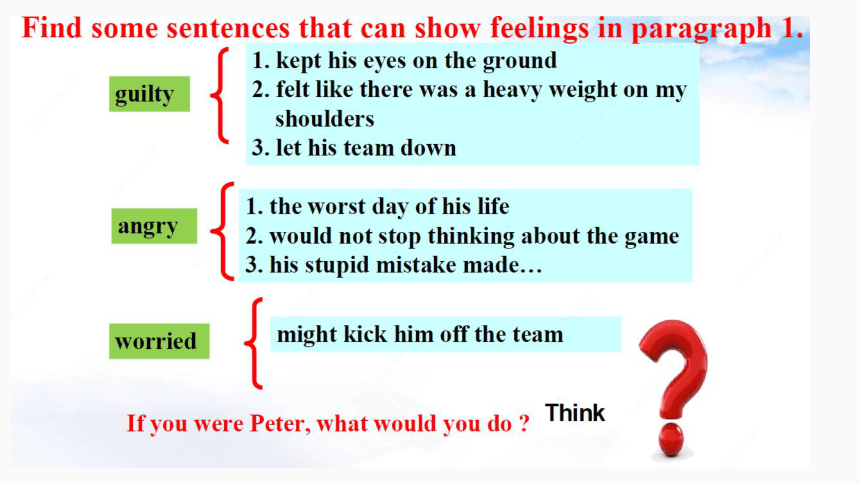
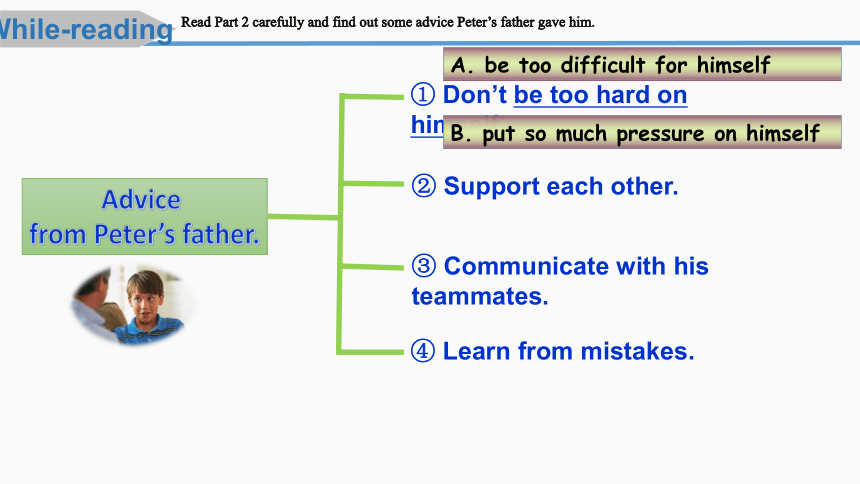
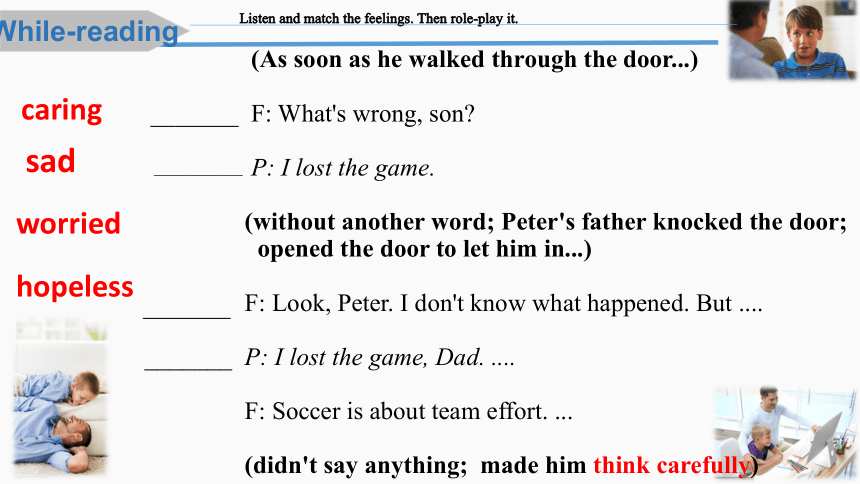
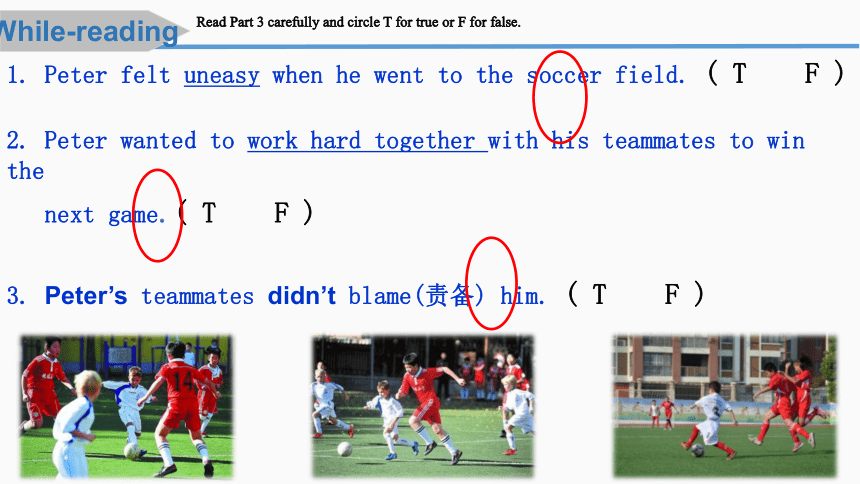
文档简介
Unit
11
Sad
movies
make
me
cry.
Section
B
(2a-2e)
The
Winning
Team
①
Get
specific
information
of
the
passage
by
using
some
reading
strategies.
(运用阅读策略从文章中获取关键信息。)
②
Know
how
to
face
the
failure
and
understand
the
love
from
our
parents.
(知道如何面对失败并能理解父母的爱。)
③
Understand
the
true
meaning
of
the
team
spirit.
(理解团队精神的真谛。)
The
main
tasks
in
this
class:
Peter
What
did
the
passage
mainly
talk
about?
1.This
boy
is
Peter.
The
other
boys
must
be
Peter's___________
because
they’re
wearing
the
same
___________.
2.They
must
be
on
a
______
team
because
there
is
a
_____________
in
the
picture.
uniforms
teammates
soccer
ball
win
a
game
soccer
3.The
soccer
team
might______________.
Did
the
soccer
team
win
the
game?
Pre-reading
There
are
three
different
places
in
the
story.
Try
to
find
them.
The
Winning
Team
On
Peter’s
way
home.
At
home.
On
the
soccer
field.
While-reading
This
passage
can
be
divided
into
three
parts
according
to
different
places.
The
Winning
Team
Part
1.
Para.____
Part
2.
Para.____
At
home.
1
2-6
7-11
Part
3.
Para.____
On
the
soccer
field.
On
Peter’s
way
home.
While-reading
Match
each
part
with
their
main
ideas.
The
Winning
Team
Part
1.
Para.1
Part
2.
Para.2-6
Part
3.
Para.7-11
C.
Feelings
of
losing
the
game.
B.
Advice
from
Peter’s
father.
A.
Encouragement
from
Peter’s
teammates.
While-reading
Read
Part
1
and
answer
the
following
questions.
While-reading
1.
What’s
his
mistake?
He
missed
scoring
a
goal.
2.
How
did
he
feel
after
the
game?
He
felt
guilty(内疚),angry
and
worried.
3.
Why
did
he
feel
angry
and
worried?
A.
got
the
ball
into
the
basket
B.
didn’t
get
the
ball
into
the
basket
He
had
let
his
team
down.
make
sb.
disappointed
B.
make
sb.
satisfied
His
stupid
mistake
made
him
angry.
His
coach
might
kick
him
off
the
team.
ask
sb.
to
leave
B.
ask
sb.
to
join
①
Don’t
be
too
hard
on
himself.
④
Learn
from
mistakes.
③
Communicate
with
his
teammates.
②
Support
each
other.
Read
Part
2
carefully
and
find
out
some
advice
Peter’s
father
gave
him.
A.
be
too
difficult
for
himself
B.
put
so
much
pressure
on
himself
Advice
from
Peter’s
father.
While-reading
(As
soon
as
he
walked
through
the
door...)
_______
F:
What's
wrong,
son?
P:
I
lost
the
game.
(without
another
word;
Peter's
father
knocked
the
door;
opened
the
door
to
let
him
in...)
F:
Look,
Peter.
I
don't
know
what
happened.
But
....
_______
P:
I
lost
the
game,
Dad.
....
F:
Soccer
is
about
team
effort.
...
(didn't
say
anything;
made
him
think
carefully)
Listen
and
match
the
feelings.
Then
role-play
it.
___________
_______
caring
sad
worried
hopeless
While-reading
1.
Peter
felt
uneasy
when
he
went
to
the
soccer
field.
(
T
F
)
2.
Peter
wanted
to
work
hard
together
with
his
teammates
to
win
the
next
game.(
T
F
)
3.
Peter’s
teammates
didn’t
blame(责备)
him.
(
T
F
)
Read
Part
3
carefully
and
circle
T
for
true
or
F
for
false.
While-reading
Read
the
story
and
number
the
events
in
the
correct
order.
2b
____
Peter
got
home
and
went
into
his
room.
____
Peter
talked
to
his
teammates.
____
Peter
missed
a
goal.
____
Peter’s
father
gave
him
advice.
____
Peter
realized
that
he
was
worried
for
no
reason.
1
2
3
4
5
n.同队队员;
队友
n.
球门;射门;
目标
While-reading
Read
the
story
again
and
answer
the
questions.
2c
Why
did
Peter
feel
angry
and
worried?
He
was
angry
with
himself
for
missing
an
important
goal
and
letting
his
team
down.
His
was
worried
that
his
coach
may
kick
him
off
the
team.
While-reading
2.
What
kind
of
advice
did
Peter’s
father
offer
him?
Peter’s
father
advised
him
not
to
be
too
hard
on
himself
but
to
learn
how
to
communicate
with
his
teammates
and
learn
from
his
mistake.
While-reading
3.
Do
you
agree
with
Peter’s
father?
Why
or
why
not?
Yes.
It
is
more
meaningful
to
learn
from
one’s
mistakes
and
do
better
in
the
future.
While-reading
4.
What
happened
after
Peter
told
his
teammates
that
he
was
sorry?
His
teammates
asked
him
not
to
worry
about
what
had
happened
as
it
wasn’t
just
one
person’s
fault.
They
agreed
that
they
should
work
together
to
think
about
how
they
could
do
better
in
the
future.
While-reading
5.
Why
did
Peter
think
that
he
was
on
a
winning
team
even
though
they
lost
the
last
game?
He
was
on
a
team
with
good
team
spirit
that
would
help
them
achieve
success
in
the
future.
While-reading
Find
idioms
or
phrases
from
the
story
to
replace
the
underlined
parts
of
these
sentences.
2d
He
could
not
believe
that
he
did
not
get
the
ball
into
the
basket.
2.
She
was
worried
because
she
had
disappointed
her
parents.
missed
scoring
that
goal
let
…
down
使失望
v.
使失望
Post-reading
3.
Tony
was
sad
that
he
was
asked
to
leave
the
team.
4.
You
should
learn
to
relax
and
not
put
so
much
pressure
on
yourself.
5.
The
teacher
told
the
students
to
work
hard
together
and
not
give
up.
kicked
off
be
too
hard
on
yourself
pull
together
Post-reading
Further
Thinking:
The
Winning
Team
?
What
should
we
do
on
a
winning
team?
①Encourage
each
other
②Support
each
other.
③Learn
to
communicate
with
our
teammates.
④Learn
from
each
other.
⑤Learn
from
mistakes
⑥Pull
together.
⑦Be
brave
to
face
the
failure(失败).
⑧Have
an
optimistic
attitude(乐观的态度).
…
…
Post-reading
Team
Spirit
Retell
Peter’s
story
by
using
the
following
words,
phrases
and
so
on.
missed
scoring
a
goal
lost
the
game
angry
worried
father
help
advice
be
hard
on
support
each
other
communicate
with
his
teammates
learn
from
mistakes
went
to
the
soccer
field
with
courage
said
sorry
to
pull
together
to
his
surprise
and
relief
nodded
in
agreement
one
person’s
fault
do
better
next
time
fell
lucky
on
a
winning
team
Post-reading
1.
Read
the
story
fluently.
2.
Sum
up
(归纳总结)
the
key
phrases
and
sentences
in
the
passage.
And
keep
these
in
your
mind.
Homework:
1.
When
we
got
hungry,
they
gave
us
food
in
time.
2.
When
it
rained,
they
opened
an
umbrella
for
us.
4.
When
we
grow
up,
they
teach
us
what
is
right
and
what
is
wrong.
3.
When
we
got
sick,
they
took
good
care
of
us.
7.
They
take
pride
in
everything
good
that
we
do.
5.
In
their
spare
time,
they
play
games
with
us.
6.
On
weekends,
they
help
us
study
at
home.
1.
He
felt
like
there
was
a
heavy
weight
on
his
shoulders
as
he
walked
home
alone.当他独自走回家的时候,感到肩上有
沉重的负担。
本句是一个主从复合句,主句是
He
felt
like
there
was
a
heavy
weight
on
his
shoulders
("feel
like+从句"句型),从句是
as引导的时间状语从句。
weight为名词,意为"重量;分量",原形weigh是动词,称重的意思。
What's
your
weight?你的体重是多少?
固定搭配:the/a
weight
of……的重量
lose/put
on/gain
weight减
肥
/增肥
I
weigh
myself
after
a
bath.我洗澡后称了体重。
Language
Points
2.
How
could
he
have
missed
scoring
that
goal?
他怎么能没有踢进那个球呢?
本句含有could
have
done
结构,意为"过去本能够做某事(却未做)",含有责备的意味。
He
could
have
won,
but
he
failed.他本来可以赢的但是他输了。
Language
Points
3.
He
had
let
his
whole
team
down.他让整个球队失望了。
let
sb.down意为"使某人失望;辜负某人的期望",是"动词+副词"构成的短语,宾语为人称代词时,则必须放在两词中间。
let
sb.down相当于make
sb.
disappointed或
disappoint
sb.
I'm
afraid
she
let
us
down
badly.恐怕她让我们大失所望。
Language
Points
4.
He
was
really
worried
that
his
coach
might
kick
him
off
the
team.
他真担心教练会把他开除出这个队。
kick
sb.off意为"开除某人"
He
was
kicked
off
the
club
for
his
bad
behavior.
他因为表现不好被俱乐部开除了。
kick为动词时,意为"踢,踹"。
He
kicked
the
ball
downstairs.他把那个球踢下了楼。
Language
Points
5.
He
opened
the
door
to
let
him
in.他打开门,让他进来。
句子结构分析本句中to
let
him
in为动词不定式做目的状语。
let
sb.in意为"让某人进来",相当于let
e
in。
Language
Points
6.
But
whatever
it
was,
don't
be
too
hard
on
yourself.
但是不管什么事,不要对自己太苛刻。
whatever相当于no
matter
what,引导的是一个让步状语从句。
Whatever
you
do,I
always
believe
you.=I
always
believe
you
no
matter
what
you
do.无论你做什么,我总相信你。
whenever无论什么时候),wherever(无论在哪),however(无论怎么样),whoever(无论是谁),它们均可引导从句,可与"no
matter十疑问词"互换。
Whenever
I
meet
him,he
always
smiles.
=No
matter
when
I
meet
him,he
always
smiles.
无论我什么时候见到他,他总微笑着。
be
hard
on
sb.
过于严格地要求某人;
对某人过于严厉;
以刻薄的方
式批评、对待某人
Language
Points
7.
Besides,
winning
or
losing
is
only
half
the
game.
而且,赢或输只是比赛的一半。
besides为副词,意为"而且",用来追加原或理由,以作补充,通常位于句首,且用逗号与后面的内容隔开。
I
don't
really
want
to
go,
Besides,
it's
too
late
now.
我并不真的想去。况且,现在太晚了。
besides还可做介词,意为"除…之外(还)".
We
have
lots
of
things
in
common
besides
music.
除了音乐,我们还有很多共同点。
Language
Points
8.
The
next
day,
Peter
went
to
soccer
practice
with
courage
rather
than
fear
in
his
heart.
第二天,彼得去参加足球训练,心中满是勇气而不是恐惧。
the
next
day意为"第二天",,表示以过去某个时间为基准
的"下一天",通常与一般过去时连用。
courage为不可数名词,意为"勇气;胆量"。
He
showed
great
courage
and
determination.
他表现得十分勇敢和果断。
lose
courage
灰心丧气
take
courage鼓起勇气
Language
Points
rather
than
的用法意为"而不是",相当and
not,侧重客观上的差别、常用于连接两个并列的名词、代词、形容词、介词短语、动名词和不定式语等。
I'd
like
tea
rather
than
coffee.我想喝茶,而不是咖啡;
(1)rather
than连接两个并列的不定式短语时,通常省略其后的不定式符号to.
I
deided
to
write
rather
than(to)telephone.
我决定写信而不是打电活。
(2)rather
han连接两个名词或代词做主语时谓语动词应与rather
than前面的名词或代词在人称为数上保持一数。
You
rather
than
I
are
going
to
go
camping,是你,不是我要去野营。
Language
Points
9.We
were
so
close
to
winning
that
game.
我们几乎要赢那场比赛了。
be
close
to意为"几乎(处于某种状态)",其中
to为介词,后接名词、代词或动名词做宾语。
I
was
close
to
tears,but
I
held
them
back.
我几乎就要掉眼泪了,但我忍住了。
be
close
to还可指"(在时间、空间上)接近...
My
house
is
close
to
a
supermarket.我的房子离一家超市很近。
Language
Points
10.But
I
think
if
we
continue
to
pull
together,
we're
going
to
win
the
next
one.
但是我想如果我们继续齐心协力,下次比赛我们会赢。
pull
together意为"齐心协力;通力合作"。
We
all
pulled
together
to
get
out
of
difficulties.
我们通力合作去克服困难。
Language
Points
11.To
his
surprise
and
relief,
his
teammates
all
nodded
in
agreement.
令他吃惊和轻松的是,他的队友们都赞许地点头。
relief为不可数名词,意为"轻松;解脱",但当它前面有形容词修饰时或在口语表达中,其前面往往可以加冠词a或
an。
常用结构∶(much)to
one's
relief意为"使某人(非常)庆幸的是"。News
of
their
safety
came
as
a
great
relief.
他们平安的消息给大家带来了巨大的安慰。
Language
Points
11.To
his
surprise
and
relief,
his
teammates
all
nodded
in
agreement.
Language
Points
01
in
agreement
意见一致
02
reach
agreement
取得一致意见
03
get
one's
agreement
得到某人的同意
12.It's
never
just
one
person's
fault.失败绝对不仅仅是一个人的错。
fault为名词,意为"过失(不可数名词),缺点(可数名词)",指性格和习惯上的弱点或行为上的过失。
It
is
mainly
because
of
my
fault.
这主要是由于我的过错。
Language
Points
13.It
made
him
feel
lucky
to
know
that
he
was
on
a
winning
team.
认识到自己在一支胜利之队,使他感到很幸运。
本句中含有一个"make+sb.+do"结构;
It是形式主语,真正的主语是后面的动词不定式短语
to
know..,know后接的是
that
引导的宾语从句。
Language
Points
14.She
was
woried
because
she
disappointed
her
parents.
她很担心,因为她令她的父母失望了。
disappoint
在此处为及物动词,意为"使失望",后常接sb.做宾语,相当于let
sb.down。
The
result
disappointed
us.结果令我们失望。
(1)disappointed失望的,沮丧的,一般由人来充当主语。
I
was
deeply
disappointed
about
the
news.我对那则消息深感失望。
(2)disappointing令人失望的,令人气馁的,一般是物做主语。
The
ending
of
the
story
was
disappointing.故事的结局令人失望。
Language
Points
14.You
should
learn
to
relax
and
not
put
so
much
pressure
on
yourself.
你应该学会放松,不要给自己这么多的压力。
put
pressure
on
sb.意为"向某人施加压力",其后可接不定式,
构成put
pressure
on
sb.
to
do
sth.意为"迫使某人做某事"。
He
may
have
put
pressure
on
her
to
agree.他可能向她施加了压力,迫使她同意。
Language
Points
11
Sad
movies
make
me
cry.
Section
B
(2a-2e)
The
Winning
Team
①
Get
specific
information
of
the
passage
by
using
some
reading
strategies.
(运用阅读策略从文章中获取关键信息。)
②
Know
how
to
face
the
failure
and
understand
the
love
from
our
parents.
(知道如何面对失败并能理解父母的爱。)
③
Understand
the
true
meaning
of
the
team
spirit.
(理解团队精神的真谛。)
The
main
tasks
in
this
class:
Peter
What
did
the
passage
mainly
talk
about?
1.This
boy
is
Peter.
The
other
boys
must
be
Peter's___________
because
they’re
wearing
the
same
___________.
2.They
must
be
on
a
______
team
because
there
is
a
_____________
in
the
picture.
uniforms
teammates
soccer
ball
win
a
game
soccer
3.The
soccer
team
might______________.
Did
the
soccer
team
win
the
game?
Pre-reading
There
are
three
different
places
in
the
story.
Try
to
find
them.
The
Winning
Team
On
Peter’s
way
home.
At
home.
On
the
soccer
field.
While-reading
This
passage
can
be
divided
into
three
parts
according
to
different
places.
The
Winning
Team
Part
1.
Para.____
Part
2.
Para.____
At
home.
1
2-6
7-11
Part
3.
Para.____
On
the
soccer
field.
On
Peter’s
way
home.
While-reading
Match
each
part
with
their
main
ideas.
The
Winning
Team
Part
1.
Para.1
Part
2.
Para.2-6
Part
3.
Para.7-11
C.
Feelings
of
losing
the
game.
B.
Advice
from
Peter’s
father.
A.
Encouragement
from
Peter’s
teammates.
While-reading
Read
Part
1
and
answer
the
following
questions.
While-reading
1.
What’s
his
mistake?
He
missed
scoring
a
goal.
2.
How
did
he
feel
after
the
game?
He
felt
guilty(内疚),angry
and
worried.
3.
Why
did
he
feel
angry
and
worried?
A.
got
the
ball
into
the
basket
B.
didn’t
get
the
ball
into
the
basket
He
had
let
his
team
down.
make
sb.
disappointed
B.
make
sb.
satisfied
His
stupid
mistake
made
him
angry.
His
coach
might
kick
him
off
the
team.
ask
sb.
to
leave
B.
ask
sb.
to
join
①
Don’t
be
too
hard
on
himself.
④
Learn
from
mistakes.
③
Communicate
with
his
teammates.
②
Support
each
other.
Read
Part
2
carefully
and
find
out
some
advice
Peter’s
father
gave
him.
A.
be
too
difficult
for
himself
B.
put
so
much
pressure
on
himself
Advice
from
Peter’s
father.
While-reading
(As
soon
as
he
walked
through
the
door...)
_______
F:
What's
wrong,
son?
P:
I
lost
the
game.
(without
another
word;
Peter's
father
knocked
the
door;
opened
the
door
to
let
him
in...)
F:
Look,
Peter.
I
don't
know
what
happened.
But
....
_______
P:
I
lost
the
game,
Dad.
....
F:
Soccer
is
about
team
effort.
...
(didn't
say
anything;
made
him
think
carefully)
Listen
and
match
the
feelings.
Then
role-play
it.
___________
_______
caring
sad
worried
hopeless
While-reading
1.
Peter
felt
uneasy
when
he
went
to
the
soccer
field.
(
T
F
)
2.
Peter
wanted
to
work
hard
together
with
his
teammates
to
win
the
next
game.(
T
F
)
3.
Peter’s
teammates
didn’t
blame(责备)
him.
(
T
F
)
Read
Part
3
carefully
and
circle
T
for
true
or
F
for
false.
While-reading
Read
the
story
and
number
the
events
in
the
correct
order.
2b
____
Peter
got
home
and
went
into
his
room.
____
Peter
talked
to
his
teammates.
____
Peter
missed
a
goal.
____
Peter’s
father
gave
him
advice.
____
Peter
realized
that
he
was
worried
for
no
reason.
1
2
3
4
5
n.同队队员;
队友
n.
球门;射门;
目标
While-reading
Read
the
story
again
and
answer
the
questions.
2c
Why
did
Peter
feel
angry
and
worried?
He
was
angry
with
himself
for
missing
an
important
goal
and
letting
his
team
down.
His
was
worried
that
his
coach
may
kick
him
off
the
team.
While-reading
2.
What
kind
of
advice
did
Peter’s
father
offer
him?
Peter’s
father
advised
him
not
to
be
too
hard
on
himself
but
to
learn
how
to
communicate
with
his
teammates
and
learn
from
his
mistake.
While-reading
3.
Do
you
agree
with
Peter’s
father?
Why
or
why
not?
Yes.
It
is
more
meaningful
to
learn
from
one’s
mistakes
and
do
better
in
the
future.
While-reading
4.
What
happened
after
Peter
told
his
teammates
that
he
was
sorry?
His
teammates
asked
him
not
to
worry
about
what
had
happened
as
it
wasn’t
just
one
person’s
fault.
They
agreed
that
they
should
work
together
to
think
about
how
they
could
do
better
in
the
future.
While-reading
5.
Why
did
Peter
think
that
he
was
on
a
winning
team
even
though
they
lost
the
last
game?
He
was
on
a
team
with
good
team
spirit
that
would
help
them
achieve
success
in
the
future.
While-reading
Find
idioms
or
phrases
from
the
story
to
replace
the
underlined
parts
of
these
sentences.
2d
He
could
not
believe
that
he
did
not
get
the
ball
into
the
basket.
2.
She
was
worried
because
she
had
disappointed
her
parents.
missed
scoring
that
goal
let
…
down
使失望
v.
使失望
Post-reading
3.
Tony
was
sad
that
he
was
asked
to
leave
the
team.
4.
You
should
learn
to
relax
and
not
put
so
much
pressure
on
yourself.
5.
The
teacher
told
the
students
to
work
hard
together
and
not
give
up.
kicked
off
be
too
hard
on
yourself
pull
together
Post-reading
Further
Thinking:
The
Winning
Team
?
What
should
we
do
on
a
winning
team?
①Encourage
each
other
②Support
each
other.
③Learn
to
communicate
with
our
teammates.
④Learn
from
each
other.
⑤Learn
from
mistakes
⑥Pull
together.
⑦Be
brave
to
face
the
failure(失败).
⑧Have
an
optimistic
attitude(乐观的态度).
…
…
Post-reading
Team
Spirit
Retell
Peter’s
story
by
using
the
following
words,
phrases
and
so
on.
missed
scoring
a
goal
lost
the
game
angry
worried
father
help
advice
be
hard
on
support
each
other
communicate
with
his
teammates
learn
from
mistakes
went
to
the
soccer
field
with
courage
said
sorry
to
pull
together
to
his
surprise
and
relief
nodded
in
agreement
one
person’s
fault
do
better
next
time
fell
lucky
on
a
winning
team
Post-reading
1.
Read
the
story
fluently.
2.
Sum
up
(归纳总结)
the
key
phrases
and
sentences
in
the
passage.
And
keep
these
in
your
mind.
Homework:
1.
When
we
got
hungry,
they
gave
us
food
in
time.
2.
When
it
rained,
they
opened
an
umbrella
for
us.
4.
When
we
grow
up,
they
teach
us
what
is
right
and
what
is
wrong.
3.
When
we
got
sick,
they
took
good
care
of
us.
7.
They
take
pride
in
everything
good
that
we
do.
5.
In
their
spare
time,
they
play
games
with
us.
6.
On
weekends,
they
help
us
study
at
home.
1.
He
felt
like
there
was
a
heavy
weight
on
his
shoulders
as
he
walked
home
alone.当他独自走回家的时候,感到肩上有
沉重的负担。
本句是一个主从复合句,主句是
He
felt
like
there
was
a
heavy
weight
on
his
shoulders
("feel
like+从句"句型),从句是
as引导的时间状语从句。
weight为名词,意为"重量;分量",原形weigh是动词,称重的意思。
What's
your
weight?你的体重是多少?
固定搭配:the/a
weight
of……的重量
lose/put
on/gain
weight减
肥
/增肥
I
weigh
myself
after
a
bath.我洗澡后称了体重。
Language
Points
2.
How
could
he
have
missed
scoring
that
goal?
他怎么能没有踢进那个球呢?
本句含有could
have
done
结构,意为"过去本能够做某事(却未做)",含有责备的意味。
He
could
have
won,
but
he
failed.他本来可以赢的但是他输了。
Language
Points
3.
He
had
let
his
whole
team
down.他让整个球队失望了。
let
sb.down意为"使某人失望;辜负某人的期望",是"动词+副词"构成的短语,宾语为人称代词时,则必须放在两词中间。
let
sb.down相当于make
sb.
disappointed或
disappoint
sb.
I'm
afraid
she
let
us
down
badly.恐怕她让我们大失所望。
Language
Points
4.
He
was
really
worried
that
his
coach
might
kick
him
off
the
team.
他真担心教练会把他开除出这个队。
kick
sb.off意为"开除某人"
He
was
kicked
off
the
club
for
his
bad
behavior.
他因为表现不好被俱乐部开除了。
kick为动词时,意为"踢,踹"。
He
kicked
the
ball
downstairs.他把那个球踢下了楼。
Language
Points
5.
He
opened
the
door
to
let
him
in.他打开门,让他进来。
句子结构分析本句中to
let
him
in为动词不定式做目的状语。
let
sb.in意为"让某人进来",相当于let
e
in。
Language
Points
6.
But
whatever
it
was,
don't
be
too
hard
on
yourself.
但是不管什么事,不要对自己太苛刻。
whatever相当于no
matter
what,引导的是一个让步状语从句。
Whatever
you
do,I
always
believe
you.=I
always
believe
you
no
matter
what
you
do.无论你做什么,我总相信你。
whenever无论什么时候),wherever(无论在哪),however(无论怎么样),whoever(无论是谁),它们均可引导从句,可与"no
matter十疑问词"互换。
Whenever
I
meet
him,he
always
smiles.
=No
matter
when
I
meet
him,he
always
smiles.
无论我什么时候见到他,他总微笑着。
be
hard
on
sb.
过于严格地要求某人;
对某人过于严厉;
以刻薄的方
式批评、对待某人
Language
Points
7.
Besides,
winning
or
losing
is
only
half
the
game.
而且,赢或输只是比赛的一半。
besides为副词,意为"而且",用来追加原或理由,以作补充,通常位于句首,且用逗号与后面的内容隔开。
I
don't
really
want
to
go,
Besides,
it's
too
late
now.
我并不真的想去。况且,现在太晚了。
besides还可做介词,意为"除…之外(还)".
We
have
lots
of
things
in
common
besides
music.
除了音乐,我们还有很多共同点。
Language
Points
8.
The
next
day,
Peter
went
to
soccer
practice
with
courage
rather
than
fear
in
his
heart.
第二天,彼得去参加足球训练,心中满是勇气而不是恐惧。
the
next
day意为"第二天",,表示以过去某个时间为基准
的"下一天",通常与一般过去时连用。
courage为不可数名词,意为"勇气;胆量"。
He
showed
great
courage
and
determination.
他表现得十分勇敢和果断。
lose
courage
灰心丧气
take
courage鼓起勇气
Language
Points
rather
than
的用法意为"而不是",相当and
not,侧重客观上的差别、常用于连接两个并列的名词、代词、形容词、介词短语、动名词和不定式语等。
I'd
like
tea
rather
than
coffee.我想喝茶,而不是咖啡;
(1)rather
than连接两个并列的不定式短语时,通常省略其后的不定式符号to.
I
deided
to
write
rather
than(to)telephone.
我决定写信而不是打电活。
(2)rather
han连接两个名词或代词做主语时谓语动词应与rather
than前面的名词或代词在人称为数上保持一数。
You
rather
than
I
are
going
to
go
camping,是你,不是我要去野营。
Language
Points
9.We
were
so
close
to
winning
that
game.
我们几乎要赢那场比赛了。
be
close
to意为"几乎(处于某种状态)",其中
to为介词,后接名词、代词或动名词做宾语。
I
was
close
to
tears,but
I
held
them
back.
我几乎就要掉眼泪了,但我忍住了。
be
close
to还可指"(在时间、空间上)接近...
My
house
is
close
to
a
supermarket.我的房子离一家超市很近。
Language
Points
10.But
I
think
if
we
continue
to
pull
together,
we're
going
to
win
the
next
one.
但是我想如果我们继续齐心协力,下次比赛我们会赢。
pull
together意为"齐心协力;通力合作"。
We
all
pulled
together
to
get
out
of
difficulties.
我们通力合作去克服困难。
Language
Points
11.To
his
surprise
and
relief,
his
teammates
all
nodded
in
agreement.
令他吃惊和轻松的是,他的队友们都赞许地点头。
relief为不可数名词,意为"轻松;解脱",但当它前面有形容词修饰时或在口语表达中,其前面往往可以加冠词a或
an。
常用结构∶(much)to
one's
relief意为"使某人(非常)庆幸的是"。News
of
their
safety
came
as
a
great
relief.
他们平安的消息给大家带来了巨大的安慰。
Language
Points
11.To
his
surprise
and
relief,
his
teammates
all
nodded
in
agreement.
Language
Points
01
in
agreement
意见一致
02
reach
agreement
取得一致意见
03
get
one's
agreement
得到某人的同意
12.It's
never
just
one
person's
fault.失败绝对不仅仅是一个人的错。
fault为名词,意为"过失(不可数名词),缺点(可数名词)",指性格和习惯上的弱点或行为上的过失。
It
is
mainly
because
of
my
fault.
这主要是由于我的过错。
Language
Points
13.It
made
him
feel
lucky
to
know
that
he
was
on
a
winning
team.
认识到自己在一支胜利之队,使他感到很幸运。
本句中含有一个"make+sb.+do"结构;
It是形式主语,真正的主语是后面的动词不定式短语
to
know..,know后接的是
that
引导的宾语从句。
Language
Points
14.She
was
woried
because
she
disappointed
her
parents.
她很担心,因为她令她的父母失望了。
disappoint
在此处为及物动词,意为"使失望",后常接sb.做宾语,相当于let
sb.down。
The
result
disappointed
us.结果令我们失望。
(1)disappointed失望的,沮丧的,一般由人来充当主语。
I
was
deeply
disappointed
about
the
news.我对那则消息深感失望。
(2)disappointing令人失望的,令人气馁的,一般是物做主语。
The
ending
of
the
story
was
disappointing.故事的结局令人失望。
Language
Points
14.You
should
learn
to
relax
and
not
put
so
much
pressure
on
yourself.
你应该学会放松,不要给自己这么多的压力。
put
pressure
on
sb.意为"向某人施加压力",其后可接不定式,
构成put
pressure
on
sb.
to
do
sth.意为"迫使某人做某事"。
He
may
have
put
pressure
on
her
to
agree.他可能向她施加了压力,迫使她同意。
Language
Points
同课章节目录
- Unit 1 How can we become good learners.
- Section A
- Section B
- Unit 2 I think that mooncakes are delicious!
- Section A
- Section B
- Unit 3 Could you please tell me where the restroom
- Section A
- Section B
- Unit 4 I used to be afraid of the dark.
- Section A
- Section B
- Unit 5 What are the shirts made of?
- Section A
- Section B
- Review of Units 1-5
- Unit 6 When was it invented?
- Section A
- Section B
- Unit 7 Teenagers should be allowed to choose their
- Section A
- Section B
- Unit 8 It must belong to Carla.
- Section A
- Section B
- Unit 9 I like music that I can dance to.
- Section A
- Section B
- Unit 10 You're supposed to shake hands.
- Section A
- Section B
- Review of Units 6-10
- Unit 11 Sad movies make me cry.
- Section A
- Section B
- Unit 12 Life is full of the unexpected
- Section A
- Section B
- Unit 13 We're trying to save the earth!
- Section A
- Section B
- Unit 14 I remember meeting all of you in Grade 7.
- Section A
- Section B
- Review of Units 11-14
